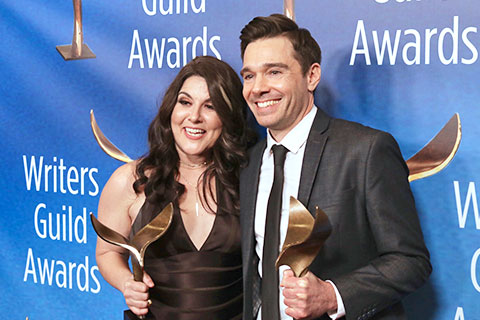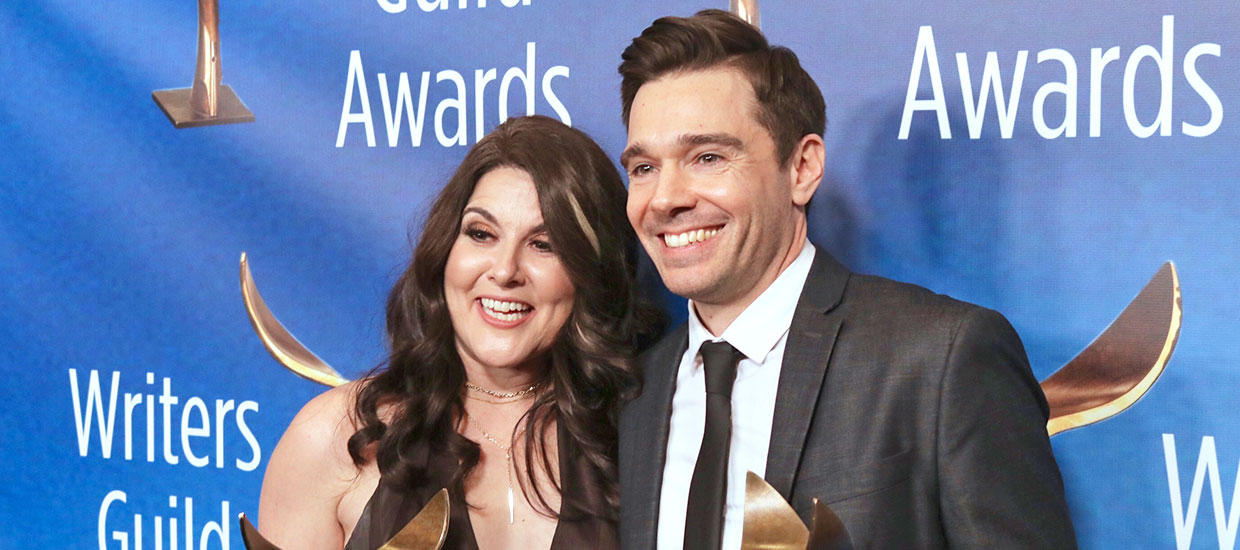Alumni Ozzy Inguanzo and Dava Whisenant, both B.S.C. '96, received the 2018 Writer’s Guild Award for Best Documentary Screenplay. The duo won for their colorful, musical documentary, Bathtubs Over Broadway, the story of a cynical comedy writer who becomes fascinated with the little-known world of industrial musicals—Broadway-style shows for private company audiences, done by some of the most recognizable corporations in America, primarily between the 1950s and the 1980s.
The film premiered at the 2018 Tribeca Film Festival and was praised by critics and audiences alike throughout its run on the festival circuit. It was released in theaters by Focus Features and has a 100% fresh score on Rotten Tomatoes.
Whisenant is an experienced editor who has worked for the Late Show with David Letterman and other projects in N.Y.C. and L.A. Bathtubs Over Broadway is her directorial debut (she won the Best New Documentary Director award at Tribeca 2018). Inguanzo is a Miami-raised Cuban-American writer, filmmaker, and published author. He is currently based in L.A. and has worked on a variety of successful films including the original Spider-Man trilogy and Logan with Hugh Jackman.
We caught up with the two, who met in their first film class at the University of Miami, to talk about their friendship, their time at UM, and their award-winning documentary.
Can you tell us about the film and how it came about?
Whisenant: I met comedy writer Steve Young, the main subject of the film, when I was an editor at the Late Show with David Letterman. I loved working with Steve because the comedy pieces he would write for the show were so inventive and unusual and hilarious, in a really fantastic, unexpected way. I worked at Late Show on and off for about four years, and during that time I had no idea Steve collected these crazy corporate albums. Like most people, I didn’t even know what an industrial musical was. Years later, after I moved to Los Angeles, Steve sent me a CD with a bunch of corporate musical songs. I didn’t listen right away because I just thought they would be horrible. When I finally did listen to the songs, they blew me away. They were so great!
The one that really grabbed me is the song My Bathroom from the American Standard plumbing fixture musical, The Bathrooms Are Coming! This song is hilarious, but it’s also poignant. It’s a gorgeous ballad about a woman finding a peaceful kind of place in her bathroom so she can have time to herself. Steve calls this song “the gateway drug” and he’s right, but I wasn’t seeing this as a film quite yet.
Then I started scratching a little deeper, and I realized how huge this hidden world of musicals was. In some ways it was bigger than Broadway; more money was being spent on corporate musicals than on Broadway shows at the time. I started following Steve as he went to find the people who made these shows. And that’s when I knew I had something. There was an extremely compelling human element to the story as well.
What was it like to work together on this?
Whisenant: I needed somebody to bounce story ideas off of, and while I could’ve hired another editor to work alongside me, I felt like Ozzy was going to be the one to really challenge me on this, and help me tell the most efficient story possible. Sometimes we don’t even have to talk, we can just look at each other and know what the other is thinking.
Inguanzo: Yeah, we have very similar instincts. Our friendship began in CMP 101 when we bonded over our shared love of Terry Gilliam's "The Fisher King," a film not widely seen by other students at the time. While Dava and I have remained very close friends throughout the years, we worked in two different worlds. I was working on fiction films and writing books, and she was primarily editing and producing documentaries. We had consulted with each other on various projects during that time, but as soon as she told me about this project, I saw the potential to collaborate and make something really great together.
Did you expect the film to be so successful?
Whisenant: I knew there was something really unusual in this story, I knew it was a world that the public was never supposed to know about, which is very intriguing, and I knew that we captured so much humor and all of this magic when Steve starts connecting with the people who made these musicals. I didn’t know exactly how I would end up putting it all together or that we would have this amazing finale at the end, but on some level, it’s not really surprising to me that people are enjoying it the way they are. We’ve been honing our craft for 20 plus years and we did a great job. I think it’s probably more surprising to other people because they see it as a debut film.
Inguanzo: I'm very proud of this film, and very happy that audiences are connecting to it as much as we do. You never know how people are going to react to something you make; you just try to do your best work and tell good stories.
What do you remember about your time at UM?
Inguanzo: One of the places on campus that Dava and I recall fondly was 'the film shack', as everyone referred to it endearingly. There were rooms with flatbeds and moviolas where we would all run off to after our classes. We would be there working on our student films into the wee hours of the night, tinkering with actual film and mixing sound on magnetic tape. We would edit our films on big flatbeds because we were working with 16mm reversal film. This was the last vestige of analog before digital.
Whisenant: The thing that I loved so much was starting to get my footing as far as what I loved doing. It was so much about collaborating with other students and trying out new ideas and just starting to understand "This is what I want to do." We were able to experiment in all these different areas…Did you want to be a DP or did you want to be an editor? Having the opportunity to make films and use that equipment, that's when I started to understand how much I loved editing.
And also, there are people I met at UM who I’m still friends with, they’re in the business in New York, in Los Angeles, and you run into them all the time, or else we’re still working together.
What are your main take-aways from this movie?
Inguanzo: This film has been a long journey, and it's so important to keep persevering in what you love to do, and continue working with people that you trust and respect.
Whisenant: I think it’s also about just following your own path, even if it seems strange to other people. Staying true to yourself, and then eventually you find your tribe that way. Sticking with it even when it’s hard, because eventually you’re going to find your people. That’s what happened to me and Oz, you know, way back. And it happens to the main character in our film as well. "Take that step" is a lyric from one of our original songs, and it speaks to that idea. So keep on going. And work hard.
Inguanzo: You always want do your best work, even if you don’t know who’s going to see it or what’s going to happen with it. You really want to have pride in your work and try to do the best that you can do regardless of whether it’s going be seen by a million people or a hundred—another theme echoed in the film.
Whisenant: Yeah! That was a big thing with the creators of the musicals, you know. They were extremely talented and were working very hard on shows that would likely only be performed once. They’d compose a whole musical, with a full orchestra! Imagine doing that, and putting in all that work, and it’s only seen one time, and often it’s not even recorded at all. Even knowing that, these artists did remarkable work. Despite the fact that they knew it would disappear shortly afterwards, they still did their best and made it amazing. They didn't know we would come calling all these years later to say: “What you did was beautiful.” It’s not about the fame, it’s about doing great work that moves people. That’s what matters.
Bathtubs Over Broadway is now available on iTunes, Amazon, and other On Demand platforms.





